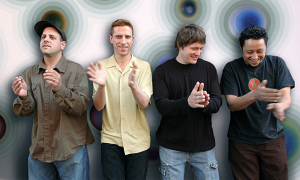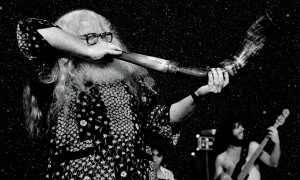Home » Jazz Articles » From the Inside Out » Rockin
Rockin
'Jack Johnson' is the single baddest record that Miles Davis ever made. And for the Black Prince of Cool, that
 “He’s not playing rock n’ roll solos on that record, he’s playing really great trumpet on a jazz level...everybody’s playing well on a jazz level. But it’s still blatantly a rock ‘n’ roll record.”
“He’s not playing rock n’ roll solos on that record, he’s playing really great trumpet on a jazz level...everybody’s playing well on a jazz level. But it’s still blatantly a rock ‘n’ roll record.” — Guitarist Robert Quine on Jack Johnson
“This is the album that is going to get Miles into the Rock ‘n’ Roll Hall of Fame.”
— Jack Johnson reissue producer Bob Belden
Jack Johnson is the single baddest record that Miles Davis ever made. And for the Black Prince of Cool, that’s really saying something. It’s a multi-level homage from Davis: To Johnson, the first black world heavyweight boxing champion and a notorious partier and womanizer; to the seething rhythms, textures, and sounds of funk and rock – to Jimi Hendrix in particular, especially his Band of Gypsies with Billy Cox on bass and funk monster heavy Buddy Miles on drums; even to the sport of boxing, to its physical and rhythmic demands and its sense of personal style , embodied by such legendary fighters as Sugar Ray Robinson and Muhammad Ali.
Boxing requires three things: Powerful force, accurately focused, delivered in proper rhythm and timing. No one of these three things, when throwing a punch, is more or less important than the other two. The same can be said about the way that Miles Davis played trumpet.
 The Men
The Men
Davis recorded Jack Johnson between February and June 1970 with pianist Chick Corea, bassist Dave Holland, drummer Jack DeJohnette, and percussionist Airto Moreira as its main players. During this time, saxophonist Wayne Shorter left Davis’ band (to form Weather Report with Joe Zawinul) and was replaced by Steve Grossman, and in the course of these sessions Davis co-conspirators former (Herbie Hancock, Ron Carter) and future (Keith Jarrett, Michael Henderson) also spirited into and out of the creative process. Oddly (or perhaps typically, for Davis), much of the sonic room on Jack Johnson was accorded to guitarist John McLaughlin, even though McLaughlin was not at the time – was not ever, really – a member of Davis’ band.
The Material
The Complete Jack Johnson Sessions (Columbia / Legacy), a new five-CD set, is precisely that: 42 tracks Davis and company recorded from February to June – 34 of them never released before – all uncut, just as they were recorded, concluding with the LP versions of “Right Off” and “Yesternow” that comprised the Jack Johnson album issued in February 1971.
The accompanying content is also quite complete: Miles’ original liner notes plus a new introduction by Michael Cuscuna and two different new essays by Bill Milkowski, one about the album and one about guitarist McLaughlin and the album. Milkowski also offers mini-reviews of all 42 tracks.
Other notations are just as detailed, such as this intricate explanation of the five consecutive takes of “Go Ahead John”: “The version of ‘Go Ahead John’ on Big Fun was oddly constructed, using various sections of the above takes. It begins with part two B, cuts to a section which uses part two A and C simultaneously, then a section with part one and part one remake simultaneously, and finally a piece of part two B for the ending.”
Mmm...that’s some goood liner notes!
 The Music
The Music
Miles’ playing rarely sounded so strong and tough, especially in the upper registers, and McLaughlin almost never played with such raw and brutal temperament, as displayed on this set.
Six takes of “Willie Nelson” dominate disc one, with Holland the fulcrum from which everything swings; as the takes progress, drummer DeJohnette grows more and more elastic, introducing snare rolls and pops that crackle like electricity. The guitar chords and rhythm interplay between McLaughlin, Holland and DeJohnette in “Johnny Bratton” boast a munchy, crunchy rock sound; this small group closes disc one as a power guitar trio on an agonized slow blues, “Archie Moore.”
“Moore” foreshadows disc two, which McLaughlin also dominates through the five different “Go Ahead John” takes, one take as another tortured electric blues, and his dance with Davis in “Duran (Take Four),” a serpentine of spitting fury. Disc three presents four takes of “Yesternow” and two of “Right Off,” the raw material from which Davis and producer Teo Macero formed the versions that appear at the end of disc five as the released Jack Johnson album.
Much of disc four consists of various “Little Church,” “Selim,” and “Nem Um Talvez” takes, precooking the sound cauldron that boils over on the subsequent album Live-Evil where finished takes of these songs first appeared. But there’s new music, too: “Little High People” dance through two pleasant movements that sound like outtakes from Medeski Martin & Wood’s Combustication jam-boree, plus “Ali (Take Four),” which mutates the bass line to “Who Knows” (from Hendrix’ Band of Gypsies songbook) and features Davis absolutely SCREAMing through his trumpet, run through echoplexer so it shrieks, howling into Jarrett’s harsh electric keyboard sound to scramble a sound omelet.
 The Message?
The Message?
Davis’ creative process – essentially jamming to sketches that explore the sounds and rhythms of rock and funk with the harmonic and improvisational tools of his jazz craft – was not without risk. “The Mask,” a freakout fueled by the dual electric keyboards of Keith Jarrett and Chick Corea processed through wah-wah and ring modulator, sounds like Sun Ra having a bad ear day. Especially in this raw form, The Complete Jack Johnson can sometimes sound a bit messy, but considering its sound and fury, this seems a reasonable price to pay.
What did Davis think of these sessions? In some form or another, this material ended up on five different albums ( Jack Johnson, Live-Evil, Big Fun, Get Up With It, and the compilation Directions ), so he must have thought them worthwhile.
The jazz on The Complete Jack Johnson Sessions comes not from what Davis and the band play, but from the way that they play it. They rock as hard and funky as any funk or rock band, but Jack Johnson is not a funk record or a rock record.
When is a jazz record not a jazz record?
Comments
Tags
For the Love of Jazz
 All About Jazz has been a pillar of jazz since 1995, championing it as an art form and, more importantly, supporting the musicians who create it. Our enduring commitment has made "AAJ" one of the most culturally important websites of its kind, read by hundreds of thousands of fans, musicians and industry figures every month.
All About Jazz has been a pillar of jazz since 1995, championing it as an art form and, more importantly, supporting the musicians who create it. Our enduring commitment has made "AAJ" one of the most culturally important websites of its kind, read by hundreds of thousands of fans, musicians and industry figures every month.






















